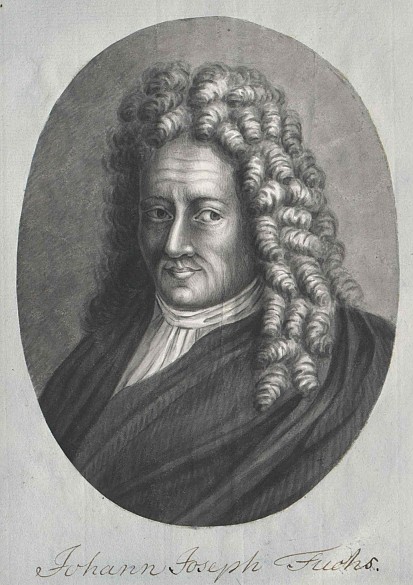Johann Jacob Fux (1660–1741) stands at the apogee of the Austrian baroque, the musical embodiment of the Hapsburgs’ world; J.S. Bach placed him first among his contemporaries. At some pint during his early career he made a trip to Italy and fell under the influence of Corelli and other contemporary Bolognese composers.
 Fux was an expert on Renaissance polyphony, a theorist famed for his work “Gradus ad Parnassum”, the single most influential treatise on counterpoint in the style of Palestrina and a work of arresting clarity which has endured centuries of changing educational styles to blight the lives of music students today. The book takes the form of a dialogue, between a master and a student, by implication Palestrina and Fux himself. At the outset Fux states his purpose: “to invent a simple method by which a student can progress, step by step, to the heights of compositional mastery …” To give him his due, Haydn taught himself counterpoint by reading it and recommended it to his pupil Beethoven, and Mozart carefully studied and annotated his own copy which still exists; Fux’s text played a major role in the development of Western musical thought, perhaps because it is a very hands on, almost modern work with the emphasis on practise rather than pure theory.
Fux was an expert on Renaissance polyphony, a theorist famed for his work “Gradus ad Parnassum”, the single most influential treatise on counterpoint in the style of Palestrina and a work of arresting clarity which has endured centuries of changing educational styles to blight the lives of music students today. The book takes the form of a dialogue, between a master and a student, by implication Palestrina and Fux himself. At the outset Fux states his purpose: “to invent a simple method by which a student can progress, step by step, to the heights of compositional mastery …” To give him his due, Haydn taught himself counterpoint by reading it and recommended it to his pupil Beethoven, and Mozart carefully studied and annotated his own copy which still exists; Fux’s text played a major role in the development of Western musical thought, perhaps because it is a very hands on, almost modern work with the emphasis on practise rather than pure theory.
By the 1690s he had moved to Vienna where the Emperor Leopold I was was sufficiently impressed by his work to appoint him court composer in 1698, despite opposition from the resident bevy of Italian musicians. They slated the first work the emperor had them perform, so the wily old sod passed a second mass as the work of an anonymous Italian. It was acclaimed and Fux bagged the job.
Fux’s music is notable for its complex contrapuntal textures, florid Italianate ornamentation and striking vocal and instrumental rhetoric. He was fascinated by the synthesis of national styles, so clearly demonstrated in the trio sonata Concentus VII, a tableau in which Italian and French musicians vie for superiority, eventually discovering that they can work together. The two play an air together, each in his own style, and all ends amicably.
© Concentus VII
